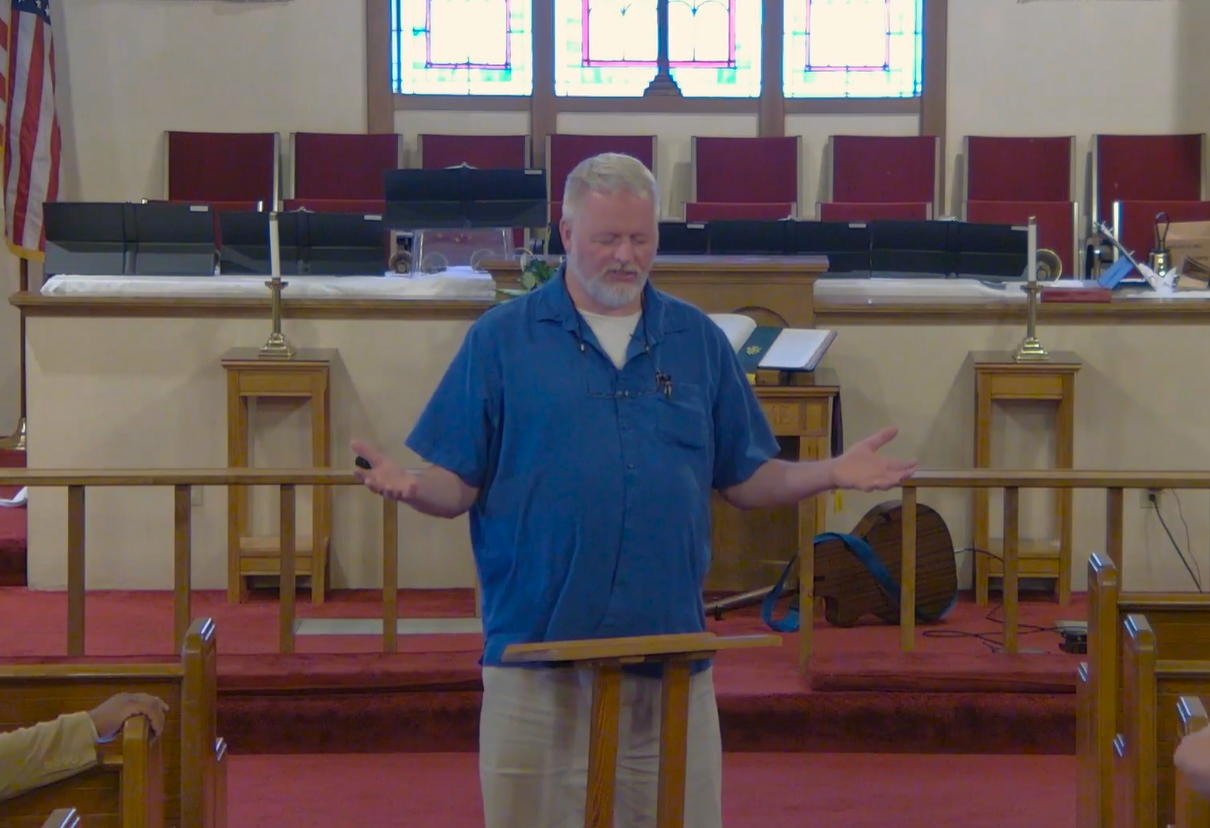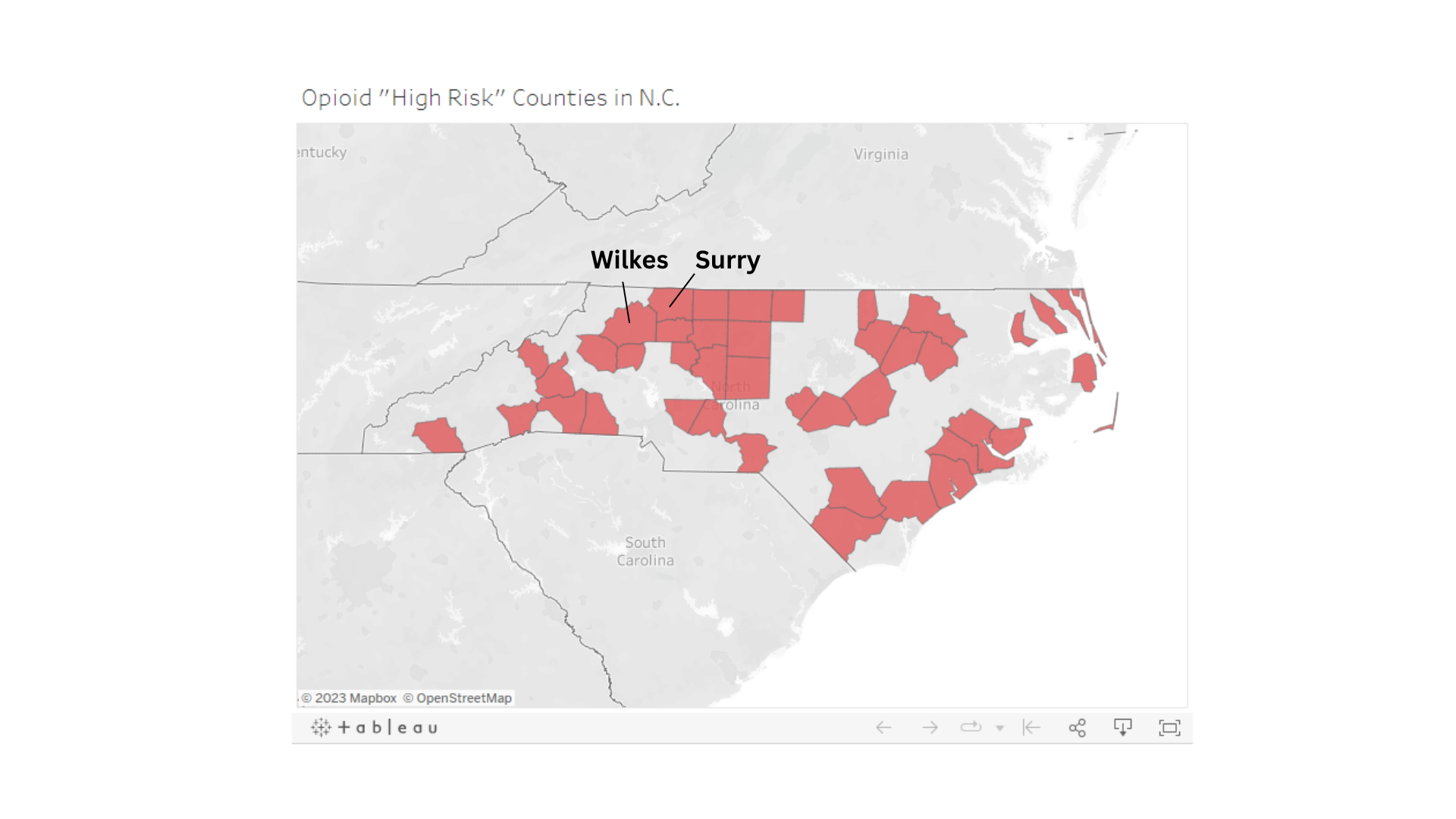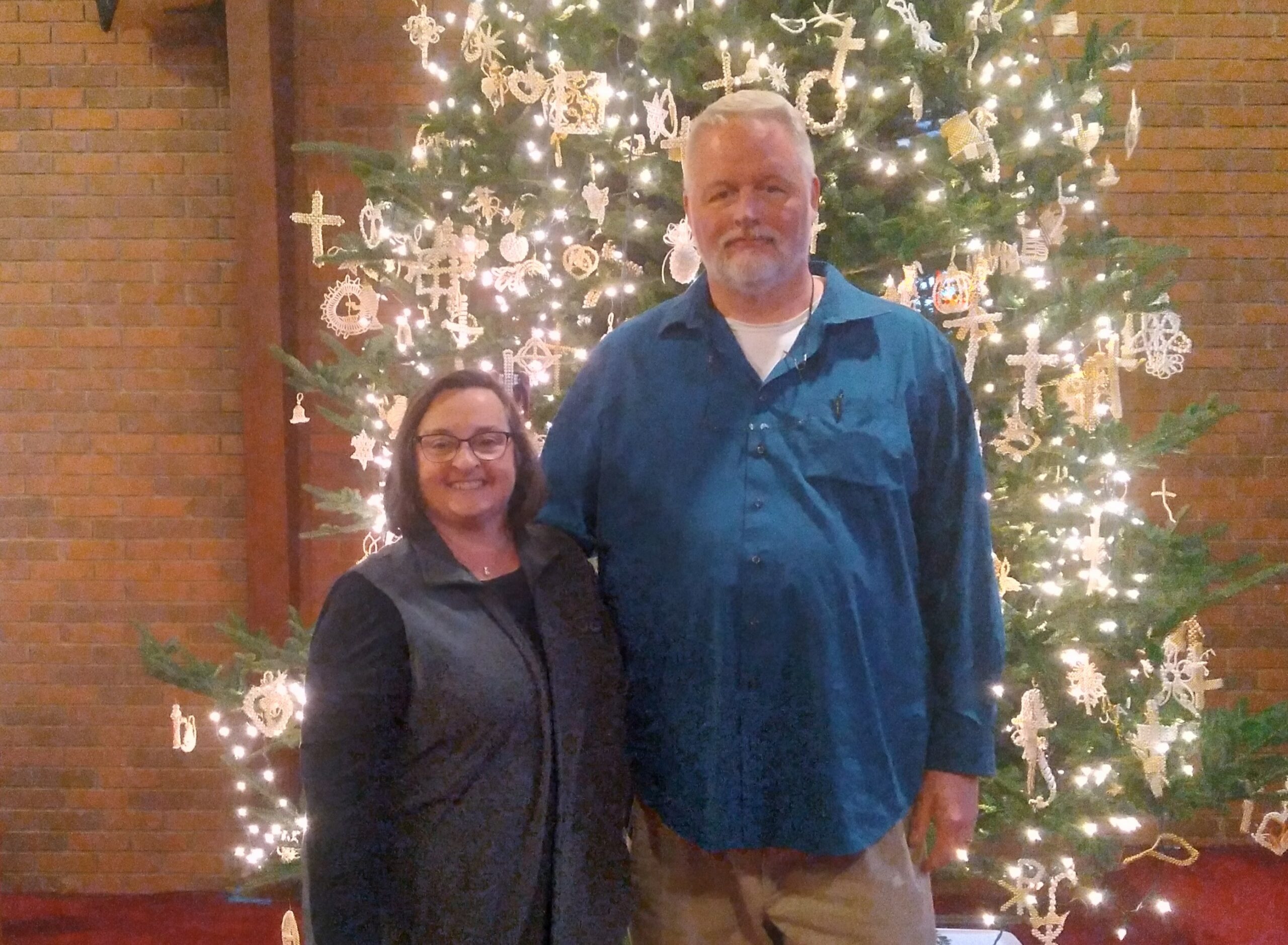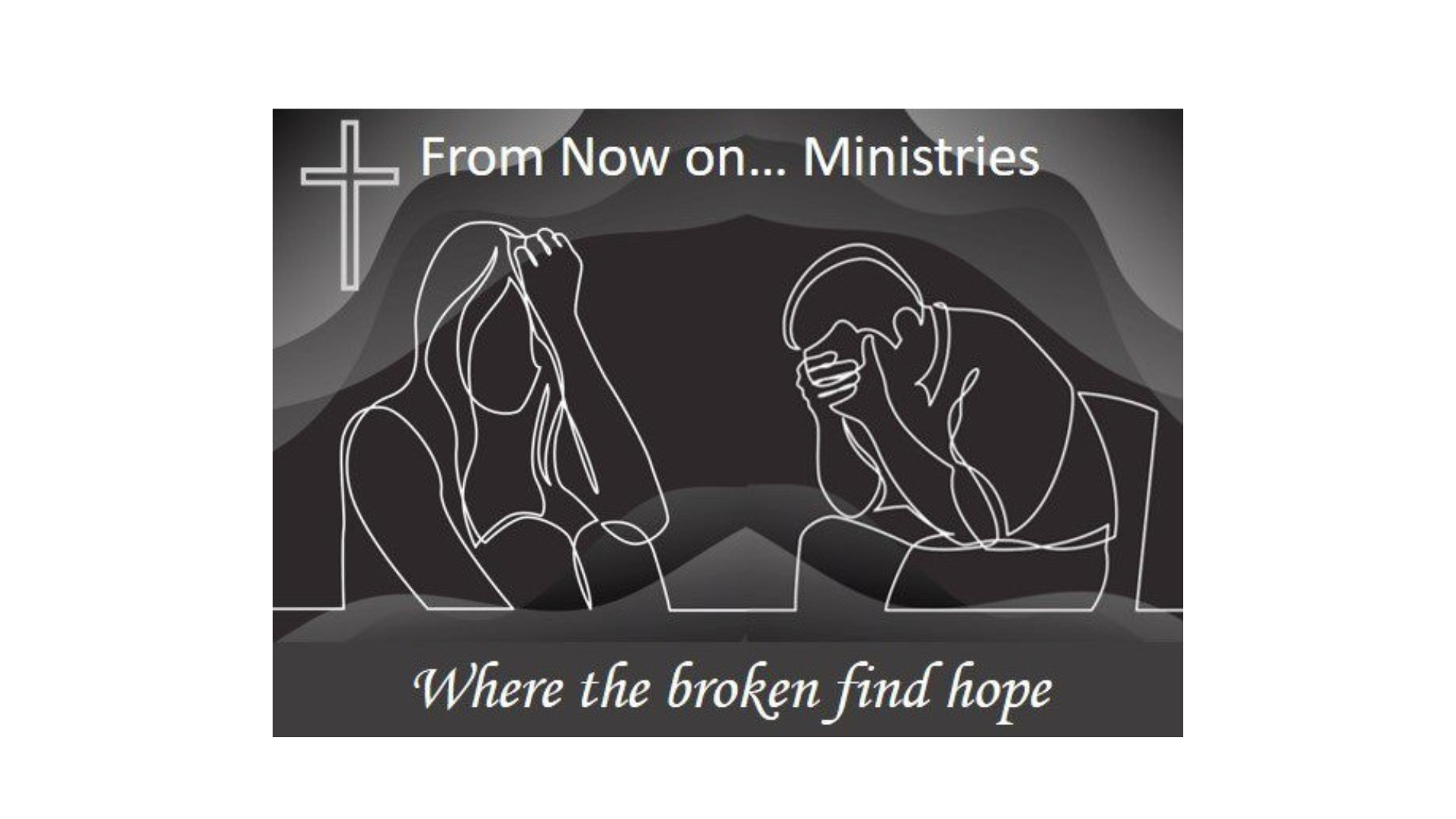
By Matt Garfield
Director of Communications
Dec. 13, 2023
This mission is a calling for Peter, who trained to become a licensed substance abuse counselor in response to the struggles he encountered with a loved one. Peter’s stepson, Aaron, passed away last year at 42. Looking back on the pivotal moments of Aaron’s battle, Peter realized he didn’t know enough to provide the kind of support his stepson needed.
“He was a very good man who had a very bad disease,” Peter said.
Today Peter shares his family’s experience – and the story of God’s faithfulness – with people in Surry and Wilkes counties, where the prevalence of overdose deaths has made national headlines.
Peter (pictured above) and the two United Methodist congregations he serves, Ebenezer and Maple Springs, want to be part of the solution. The churches have partnered to create a faith-based recovery ministry for individuals and families overcoming addiction.
The initiative, supported by the Foundation’s Reynolds Ministry Fund, takes its name from the God of “From Now On,” and the belief that our broken pasts do not have to write our future.
Or, as Revelation 21:5 (NLT) puts it: “And the One sitting on the throne said, “Look, I am making everything new!”
“So many people struggle with isolation and desperation,” Peter said. “I believe lives can be healed when there are enough positive community fellowship programs encouraging sobriety and health.”
Faith leaders involved in the project see great promise.
“I have witnessed this ministry taking hold within the past year,” said Rev. Randy Johnson, a co-leader and licensed clinical mental health counselor. “Some people come consistently and some come sporadically. But any ‘moments’ can be important in bearing fruit down the road.”

Churches share heart for mission
These are hard times in a part of the state reeling from the loss of textile, furniture and tobacco jobs. It’s basically Appalachia with an interstate running through it. The proximity to I-77 makes it easy for illicit drugs to find their way in, leaving behind broken families, incarcerations and overdoses.
Peter, 53, knows the terrain well. The loss of Aaron, who died of liver disease after a long struggle with drugs and alcohol, pushed Peter to take his ministry in a new direction.
“He was sober his last six months,” Peter said. “And he was able to make peace with the family.”
Peter’s story gives him credibility with people facing their own demons. He has support from those in the pews at Ebenezer (Elkin) and Maple Springs (Ronda), a pair of small yet healthy congregations that share a heart for serving. Both are involved with food pantries, a local shelter for women and agencies dedicated to the poor and marginalized.
Now church members have embraced something entirely new. Maple Springs opens its doors for a recovery worship service on Sunday afternoons and 12-step meetings on weekday evenings. There are hopes to add dance and music classes for children impacted by the substance use of loved ones.
The Reynolds Ministry Fund helped Maple Springs upgrade its A/V system for online worship. Now the message can reach far beyond the church walls.
With his usual world-weary candor, Peter preached this past Sunday on the difficulty of going home for the holidays while in recovery. Spoiler alert: It’s not easy.
“Our tendency is to watch those satanically inspired Hallmark films,” he told listeners, “and to think, ‘Oh, this is going to be the year when everything is great.’ What we realize is that, odds are, things are just as screwed up as they were when we were growing up.”
He elaborated: “For many of us, where we come from is a trigger, and our families often bring out the worst in us. They’ve seen us try and fail, and so they’re suspicious…The reality is, if we are in recovery to make everyone happy, we’re doing it for the wrong reasons. We are only responsible for what we do.”
‘A God thing’
Among those listening to Peter’s message was a woman named Debbie, who lives in Jonesville five miles from the church.
Debbie began attending in April, a few months after her adult son, Jason, died from a fentanyl overdose. His loss sent Debbie into a spiral of anxiety and panic attacks. She saw a write-up about the ministry in the Elkin newspaper.
“I really believe it was a God thing,” she said.
Debbie has been welcomed into the life of the church, most recently at a potluck dinner where members of Maple Springs sat alongside folks in the recovery group.
“I really appreciated that,” Debbie said, “because it gave me a chance to thank them for opening their church and inviting us in.”
After attending a recent worship service, Rev. Annalee Allen (pictured with Peter below) said she was impressed by how participants take the lead in shaping the ministry. For example, a women’s-only support group was added at the urging of female participants who said it would create a more comfortable atmosphere for sharing.
“Peter has been intentional about listening to the needs of women in recovery,” said Annalee, Director of Reynolds Ministries and Programs. “They can best determine the direction the ministry should take. It was exciting to see participants be a part of dreaming and designing future gatherings.”

One of the greatest things lacking in a lot of treatment is the spiritual dimension.
- Rev. Randy JohnsonChanging mindsets, changing hearts
In the 1990s, misleading marketing by opioid companies helped drive up prescription rates, particularly in blue-collar areas across Appalachia. Some residents became addicted to painkillers. Over time, they started using heroin and fentanyl, and the epidemic spread into suburbs and cities nationwide (Source: NC Health News).
Since 1999, statistics show that nearly one million Americans have died from opioid overdose. However, because many overdose deaths are never reported, the actual number is thought to be much higher.
Surry County created an Opioid Response Team to coordinate intervention, treatment and recovery efforts. Local law enforcement now carries Narcan, a medication (naloxone) that can reverse opioid overdose.
Wilkes County defines itself as a “community in recovery,” and empowers nonprofits such as Wilkes Recovery Revolution to help residents find whatever resources they need, such as detox or job opportunities.
New data offers reason for hope. Surry County no longer ranks in the top 10 counties for opioid overdose deaths and emergency room visits. Wilkes County overdose deaths were below the statewide average in each of the past two years, according to state health figures.
Often in rural communities, a stigma surrounds the issue of drug misuse. Churches can play a role in shifting mindsets toward shared ownership of the problem, says Rev. Ray Morgan, an advocate who previously served in Mount Airy (Ray now serves two churches in Lexington).
“There is a remarkable, miraculous ingredient that we possess as the Church – love,” Ray said. “If we are willing to look at folks caught in addiction with love instead of judgment, that would give them hope. And if they have hope, they might believe it is possible to turn things around.”
This is the type of setting where Jesus might go to work. Until that day comes, Peter and the people of Ebenezer and Maple Springs will do all they can.
“Ultimately, our belief is that enduring change comes from an investment in a relationship with Jesus Christ,” Peter said. “The community of fellowship He intended for us will help people heal from many of life’s struggles.”

For Cross Connection, new name reflects big plans for growth
"The heart of Cross Connection is the same," the executive director said. "We’re still rooted in Christ—and growing into a fuller vision of the Church."
A pastor and his trumpet bring new energy to High Point church
Jazz is a regular part of worship at Memorial UMC in High Point, where Rev. Darryl Donnell brings a relatable style to preaching the Word.
An Asheville church seeks to ‘restore dignity’ in a time of fear
An Asheville congregation has befriended Spanish-speaking neighbors through a mobile food market, block parties and Know Your Rights events.